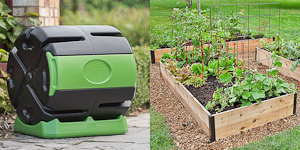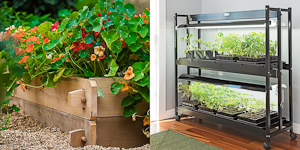- Home
- How to Start Seeds Indoors
- Seed Starting Trays
Seed Starting Trays, Lights & Supplies
These Favorites Save Money and Speed Harvest
When I finally break out my seed starting trays in January and February, I’m in seventh heaven. I save a ton of money by growing my own starts, and I can grow exactly the varieties I want, rather than just what they have at the stores. (For complete indoor seed-starting guidelines, see How to Start Seeds Indoors.)
I also use my seed starting trays and light shelves all fall and winter to grow lettuces, microgreens and marigolds indoors, which helps keep me from going gardener-stircrazy in the winter!
Lights for Starting Seeds Indoors
A durable seed starting light rack can produce hundreds of garden starts every year, and will pay for itself quickly. The things to look for in a seed-starting system are:
- Optimal light spectrum and intensity to speed growth and keep plants from becoming spindly.
- Ease of height adjustment to keep lights 2-4” above the seedlings.
- Attractive enough for kitchen or living room so you can easily monitor growth and moisture
- Sturdy and durable construction that makes the investment pay for itself
The SunLite Garden has all these features and comes in different sizes and styles to match your needs.
A cheaper, more DIY (and much uglier!) system that works well is a 4-5' wide by 18-24" deep wire rack (Costco, Amazon) with fluorescent shop lights hung from the shelf above.
Trays for Starting Seeds Indoors
Who knew that seed-starting trays came in such a huge array of choices? Are some better than others, and if so, why?
I've been starting seeds indoors ahead of the season for thirty+ years now, and I have tried every kind of seed starting tray there is. The first ones I used were freebies from the trash bins behind my local nursery - those flimsy ones that crack down the sides when you try to remove the starts. They did the job, and despite being "disposable", I couldn't really complain because they were... well, free. These are still sold everywhere, but I never liked to buy single-use trashy plastic, even before the oceans became awash with it.
To me, it is worth the investment to buy really sturdy, strong, heavy permanent plastic seed starting trays that can be sanitized and used year after year, forever. Unfortunately these are now harder to find, because retailers want you to come back year after year to replace the cheap ones that eventually fall apart.
The ones on the left below are no-frills, deep-root seed starting trays, which have 15 cells and are the sturdiest I have ever found (that are available for consumer use). They're deep enough for excellent root growth and durable enough to last forever. Engineered with little grooves down the insides that stop roots from circling the pot, they let seedlings develop much larger root systems after transplant, which is key to higher yields. Plus, they're inexpensive!
If you want them with a grow dome and a self-watering mat and reservoir, they come that way too (shown in the middle). I use the plain ones on the left (or soil blocks, described below, if I manage to get my act together early enough in the season!)
Soil Block Maker
|
The best and most earth-friendly option is to use a soil blocker. Soil blocks are more work up-front, but save time in the long term because you just plant the whole thing, like a peat pot, but with zero root restriction. Soil blocks work by "air pruning", which means that when the seedling's roots reach the edge of the block, they just stop growing until they are planted out, at which point the roots take off like gangbusters. Eliot Coleman, the Maine organic farmer who wrote The Four Season Harvest and The New Organic Grower, first turned me on to soil blocks. He uses soil blockers that crank out up to 50 cells at a time, but the home gardener will do just fine with a four-cell version. You can buy them in a series of sizes, so if you need to pot a seedling up to a bigger pot, each successive size is made with a square hole in the top that accepts the smaller sized soil block whole. The only downside to soil blocks (if it IS a downside...) is that you can't use regular potting mix. You have to add peat moss to the potting mix in order to make it hold together, or make your own soil block mix from scratch, which is cheaper anyway and is what I do. (I live in Colorado, and I buy a lot of stuff like minerals, kelp meal and bales of peat on the cheap from our ubiquitous pot-growing supply stores). (And for whatever it's worth, no I don't. Not that you shouldn't. But those guys at the store know how to grow things and are a wealth of information.) |
Eliot Coleman uses these to start seedlings on his farm. They hold together and go right in the ground, 
Eliot Coleman's Soil Block Recipe
I use a small cement-mix tray from Home Depot to mix this up. Lightly moisten the mix till it holds together when squeezed in your hand. Press the soil blocker down into the pile of mix till packed, then lift out and eject the blocks onto a tray. (I use a boot tray, also from Home Depot.) |
Peat Pots, Cow Pots and Newspaper Pots
Another option that some people like are "plantable" peat pots or cow pots. They are biodegradable, which sounds good, but I don't like them for two reasons. One, they are so slow to break down in the soil that they impede free root growth after planting (while you wait for them to rot), and two, you have to buy more every year.
If you time it just right, you can also make newspaper pots using a beautiful little tool called the paper pot maker. These "pots"break down quickly after transplant, and are free, forever. Their downside is that you have to time your transplant-out carefully, because if you don't, the newspaper falls apart before plantout, leaving a mush of soil and broken roots.
Other Seed Starting Tools
Nothing speeds germination and growth like a seedling heat mat. These low wattage, waterproof mats add 10-20 degrees of warmth underneath your seedlings, keeping them healthy, happy and growing strong. My basement is cold in the winter, but my seedlings are warm and getting a great head start. I also have my heat mats on a controller, that turns them off when they reach a pre-set temperature.
Heat mats are especially important for heat-loving peppers, tomatoes and eggplants. (Cucumbers and squash should not be started indoors at all because they will be stunted for the whole season by even the slightest root disturbance).
|
I use the top of my dryer as a potting bench. That's why I have potting mix in my clothes. 
|
Heat Mats I save a ton of money by starting my own seeds in late winter. My heat mats are a necessity and especially helpful for tomatoes and peppers! 
|
These galvanized steel trays are durable and "green": no landfill for these guys. 
|
Help share the skills and spread the joy
of organic, nutrient-dense vegetable gardening, and please...
~ Like us on Facebook ~
Thank you... and have fun in your garden!
Affiliate Disclaimer
This website contains affiliate links to a few quality products I can genuinely recommend. I am here to serve you, not to sell you, and I do not write reviews for income or recommend anything I would not use myself. If you make a purchase using an affiliate link here, I may earn a commission but this will not affect your price. My participation in these programs allows me to earn money that helps support this site. If you have comments, questions or concerns about the affiliate or advertising programs, please Contact Me.Contact Us Page
You Are Here: Vegetable Gardening Home > Starting Seeds Indoors > Best Seed Starting Trays and Lights







